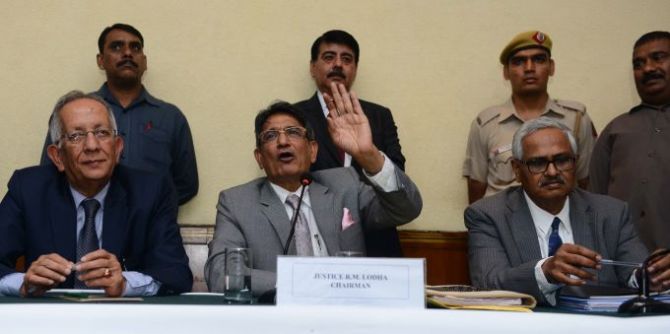'One state-one vote may not be a good idea in this country. There are Railways, Services, universities, Maharashtra, Baroda. Their arguments have impressed upon us to some extent. We may consider the issue in future debates'

The Supreme Court on Monday indicated that it is willing to reconsider contentious recommendations of the Justice R M Lodha Panel which included the policy of 'one state-one vote' rendering regular BCCI members like Railways and Services as associate ones without voting rights.
A bench headed by Justice Dipak Misra said that arguments raised by Railways, Association of Indian Universities and Services about their voting rights have "impressed" the court.
"One state-one vote may not be a good idea in this country. There are Railways, Services, universities, Maharashtra, Baroda. Their arguments have impressed upon us to some extent. We may consider the issue in future debates. How, many vote they can have, we will debate," a bench also comprising justices A M Khanwilkar and D Y Chandrachud said.
The apex court also indicated that it may re-consider the issue of restricting the national selection Panel of cricketers to three members only from five-member Panel, earlier.
"We may also debate on number of members in selection board. Earlier, there were not so many matches played like it is played today. One, who has played number of one day matches may not have played as many Test matches or vice versa. That depends on player to player," the apex court said.
Earlier, the BCCI used to have five-member Panel of national selectors representing different cricket zones of the country and in pursuance to Lodha Panel recommendation, the number of members was reduced to three.
The bench had on July 14, also said "if we look into the history, we cannot deny the contribution made by Railways to cricket. If any wrong has been done, then it can be corrected".
In its verdict on July 18 last year, the court had accepted the suggestions of the Lodha Panel saying, "This is a measure which has been recommended with a view to structurally streamlining the BCCI to make it more responsive and accountable having regard to the aspiration of different regions for an equal opportunity to participate in the growth and promotion of the game in the country".
It had then dealt with the facts that states like Gujarat and Maharashtra have three cricket associations each which are full-fledged members of the BCCI and said "the only reasonable and rational answer to the problem within the broad principle of 'one state-one vote' would be to allow the full membership of BCCI to rotate among the three clubs on an annual basis".
The court had said that some of the clubs or associations, if not all are the founding members of BCCI and a balance needs to be struck with historical reality and the need for adopting a pragmatic, uniform and principled approach aimed at reforming and rationalising BCCI's structural edifice.
"The recommendation made by the committee to the extent it provides for one vote for each state is unexceptionable nor should there be any compromise with what is proposed as a reformative measure...," the bench had said.
The apex court had favoured the suggestions that the status of clubs and boards like Railways Sports Promotion Board, Association of Indian Universities, Services Sports Control Board, National Cricket Club (Kolkata) and Cricket Club of India (Bombay) be not considered as full members as "they do not represent any geographical territory".
It had further said, "We see no merit in that contention nor do we see any reason to disagree with the recommendation made by the committee, who has upon a thorough consideration of all facts and circumstances relevant to the working of the BCCI, recommended the conversion of the clubs and associations without a territory from full members to associate members".
It had said that clubs including the Railways Sports Promotion Board, Association of Indian Universities and Services Sports Control Board do not represent any region nor do they receive any monetary benefits are enough reasons for converting their full membership to associate membership.
The court had clarified that the right to vote will remain confined to full members representing definite geographical regions or territories only.
Image: Justice Rajendra Mal Lodha (centre) during a press conference
Photograph: PTI












 © 2025
© 2025